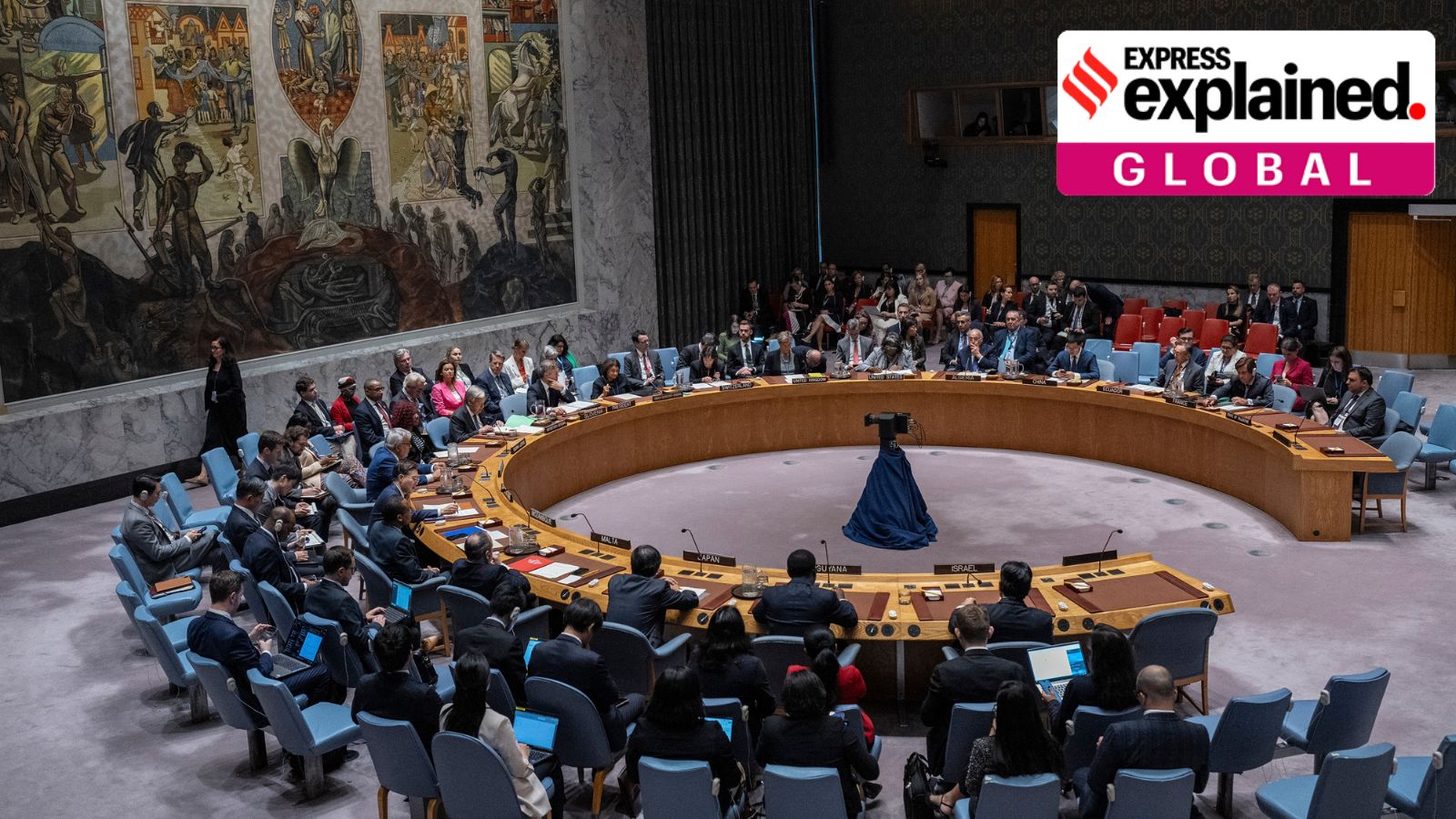United Nations Day 2024: 3 interventions that helped shape the organisation
Early on, the UN was engaged in resolving some pressing international disputes, including the Israel-Palestine conflict and the Korean War. We recall.
 A U.N. Security Council meeting held to discuss the escalating conflict between Israel and Hezbollah at U.N. headquarters in New York on Friday, Sept. 27, 2024. (Graham Dickie/The New York Times)
A U.N. Security Council meeting held to discuss the escalating conflict between Israel and Hezbollah at U.N. headquarters in New York on Friday, Sept. 27, 2024. (Graham Dickie/The New York Times)October 24, 2024 marks 79 years since the United Nations was formed. Originally mandated to replace the League of Nations, the UN came about at a tumultuous time – World War II had just ended, leaving a new global order in its wake. The organisation was tasked with maintaining peace and security and advocating for international cooperation while honouring the human rights and self-determination of different groups.
Since then, the UN has also met with its share of criticisms. In 1994, for instance, the organisation failed to stop the Rwandan genocide. The ongoing conflict in Gaza continues more than a year after it began, with no end in sight to Israel’s military action. Despite numerous condemnations and resolutions, the UN’s inability to bring peace to the region has been pilloried.
Early on, the organisation was engaged in resolving some pressing international disputes. We recall three major instances that helped transform the organisation over the decades.
1. Israel-Palestine: Resolution 181 and the contentious two-state solution
After the defeat of the Ottoman Empire in World War I, its domains were divided among the Allied powers, with the eventual aim of promoting self-governance. Palestine fell under the British mandate. In May 1947, the UN instituted the UN Special Committee on Palestine (UNSCOP) to resolve the issue of the future government of Palestine.
A key proposal was creating a separate Jewish state out of what was then called Mandatory Palestine. The Palestinian leadership boycotted the committee while the Zionist faction presented a case in a matter that led to the UNSCOP awarding them “with a recommendation that mandatory Palestine be divided and that the Jews be given 62 per cent of western Palestine, even though the Arabs outnumbered the Jews by almost two to one.” (Lori Allen, Land of Blue Helmets: The United Nations and the Arab World, 2017)
Following this, the UN General Assembly adopted Resolution 181 in November 1947 for a two-state solution. The resolution included the contentious Partition Plan for Palestine, a four-part document that recommended the end of the British mandate, the withdrawal of British armed forces by August 1948, the drawing of boundaries between the two proposed states and Jerusalem, and other provisions.
The result was the immediate beginning of a civil war in the region between Arab and Jewish communities. As fighting continued, the Zionist forces escalated their offensive between April and May 1948, resulting in the Nakba, the massive exodus of the country’s majority Arab population. Israel was formed on May 14, 1948, days before the British withdrew from the region and the start of the larger Arab-Israeli war.
Former UN Secretary-General Kofi Annan said in 2006 that the organisation’s failure to find a lasting solution to the conflict “would continue to hurt the reputation of the United Nations and raise questions about its impartiality”, as well as affect its efforts to resolve other conflicts, such as those in Iraq and Afghanistan.
2. Korean War: Formation of the UN Command
With the end of World War II in 1945, the Korean peninsula was divided into two regions – the Democratic People’s Republic of Korea in the North supported by the Soviet and Chinese communists, and the Republic of Korea in the South aided by the US.
Five years later, North Korea’s invasion of the South, led by its leader Kim Il Sung, triggered the Korean War. This move was denounced by the UN and the US, which suspected this to be a covert attempt for control by the Soviets during the Cold War.
The UN Security Council convened an emergency session to condemn the invasion. It also passed two resolutions — Resolution 82 on June 25 decried the invasion and demanded an immediate ceasefire, while Resolution 83 two days later urged member states to offer military support to South Korea. This led to the formation of the UN Command, the first international unified command under the United Nations Charter. The command comprised troops and medical personnel from 22 member countries, led predominantly by the US.
Eventually, neither side secured a decisive victory, and an armistice was signed in 1953. This led to the creation of the Korean Demilitarised Zone (DMZ), which divided the peninsula in half, but no permanent peace treaty was signed.
The situation also led to the UNGA signing Resolution 377A, or the Uniting for Peace resolution. It mandated the General Assembly to deliberate on matters of international security and peace in events where the UNSC’s five permanent members were unable to arrive at a unanimous resolution or any member used their veto power to stall the UNSC’s functioning.
3. The Suez Crisis and the UN’s peacekeeping unit
The 1956 Suez Crisis presented an opportunity for the UN to learn from its interventions in Korea, most notably the creation of its first peacekeeping force.
In July 1956, tensions flared up as Egypt nationalised the Suez Canal Company, controlled by French and British interests until then. This move was to protest the joint decision by the UK and US to fund the construction of the Aswan High Dam on the River Nile. The Western powers were concerned about Egypt’s growing proximity to the Soviet Union, which eventually aided the dam’s construction.
The Suez Canal connects the Mediterranean Sea to the Red Sea and is the fastest maritime route connecting Europe and Asia. The UK and France feared that Egyptian President Gamal Nasser would close the canal and cut off intercontinental petroleum shipments.
A crisis unfolded as Israeli forces struck Egypt on October 29, with British and French support, taking control of the canal. They were forced to withdraw amid domestic unpopularity for the move and pressure from the US and the UN.
The UN broke through a UNSC stalemate through the Uniting for Peace resolution and convened an emergency session of the UNGA to call for a ceasefire and withdrawal of all foreign forces from the occupied regions. The UN also established the UN Emergency Force (UNEF), its first-ever peacekeeping unit to monitor the withdrawal of foreign troops from Egypt, and to act as a buffer between the rival Egyptian and Israeli forces.
- 01
- 02
- 03
- 04
- 05






































